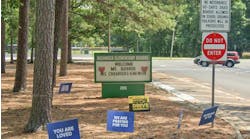More than 30 higher-education institutions contend in a court filing that President Donald Trump’s latest immigration order, if allowed to stand, would detract from their educational missions.
The Harvard Crimson reports that Harvard and 30 other colleges and universities submitted a amicus brief in support of a nationwide injunction on the order, which restricts travel to the United States from several Muslim-majority nations.
A federal judge in Maryland issued the injunction March 16, reinforcing an earlier decision by a judge in Hawaii to prevent the order from taking effect. The Justice Department is challenging that injunction in the Fourth Circuit Court of Appeals.
The universities argue in their brief that if the travel ban goes into effect, they will become less diverse and lose international prominence.
“The Executive Order has serious and chilling implications for amici’s students, faculty, and scholars,” the brief reads.
In addition to Harvard, the schools that have signed on to the amicus brief include Georgetown, Duke, Carnegie Mellon, University of Chicago, Vanderbilt, Rice and Stanford.
Trump's executive order seeks to bar citizens of six predominantly Muslim countries—Iran, Libya, Somalia, Sudan, Syria, and Yemen—from obtaining new visas to enter the United States.
This is the second time the courts have challenged Trump’s immigration efforts; a Seattle federal judge struck down the previous order, which included Iraq in the list and restricted travel for current visa holders as well.
In Friday’s brief, the universities argue that the second order “risks the same damage” as the first, as it similarly hinders their abilities to bring international students and scholars to their campuses. International students make up more than 5 percent of the students at U.S. higher-education institutions, the brief states.
“The Executive Order at issue here, like its predecessor, threatens amici’s ability to continue to attract these individuals and thus to meet their goals of educating tomorrow’s leaders,” the amicus brief says.
The brief follows a similar line of argument as those presented against the first ban, emphasizing the positive contributions international students and scholars make to their institutions and the United States more broadly.
"By prohibiting entry by persons from the six affected countries, the Executive Order divides current students and their families, impairs the ability of American universities to draw the finest international talent, and inhibits the free exchange of ideas," the brief argues.


